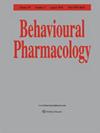Prior cocaine self-administration does not impair the ability to delay gratification in rats during diminishing returns.
IF 1.6
4区 心理学
Q3 BEHAVIORAL SCIENCES
引用次数: 0
Abstract
Previous exposure to drugs of abuse produces impairments in studies of reversal learning, delay discounting and response inhibition tasks. While these studies contribute to the understanding of normal decision-making and how it is impaired by drugs of abuse, they do not fully capture how decision-making impacts the ability to delay gratification for greater long-term benefit. To address this issue, we used a diminishing returns task to study decision-making in rats that had previously self-administered cocaine. This task was designed to test the ability of the rat to choose to delay gratification in the short-term to obtain more reward over the course of the entire behavioral session. Rats were presented with two choices. One choice had a fixed amount of time delay needed to obtain reward [i.e. fixed delay (FD)], while the other choice had a progressive delay (PD) that started at 0 s and progressively increased by 1 s each time the PD option was selected. During the 'reset' variation of the task, rats could choose the FD option to reset the time delay associated with the PD option. Consistent with previous results, we found that prior cocaine exposure reduced rats' overall preference for the PD option in post-task reversal testing during 'no-reset' sessions, suggesting that cocaine exposure made rats more sensitive to the increasing delay of the PD option. Surprisingly, however, we found that rats that had self-administered cocaine 1-month prior, adapted behavior during 'reset' sessions by delaying gratification to obtain more reward in the long run similar to control rats.在收益递减过程中,事先自我摄入可卡因不会损害大鼠延迟满足的能力。
在对逆向学习、延迟折现和反应抑制任务的研究中,以前接触过滥用药物的人会产生障碍。虽然这些研究有助于人们了解正常的决策以及滥用药物如何损害决策,但它们并不能完全反映决策如何影响延迟满足以获得更大长期利益的能力。为了解决这个问题,我们使用了收益递减任务来研究曾自我注射可卡因的大鼠的决策能力。这项任务旨在测试大鼠选择在短期内延迟满足以在整个行为过程中获得更多奖励的能力。大鼠有两个选择。其中一个选择有获得奖励所需的固定延迟时间[即固定延迟(FD)],而另一个选择则有一个渐进延迟(PD),从 0 秒开始,每次选择渐进延迟选项都会增加 1 秒。在任务的 "重置 "变化中,大鼠可以选择 "固定延迟 "选项来重置与 "渐进延迟 "选项相关的时间延迟。与之前的结果一致,我们发现在 "无重置 "环节中,之前的可卡因暴露降低了大鼠在任务后逆转测试中对PD选项的整体偏好,这表明可卡因暴露使大鼠对PD选项的延迟增加更加敏感。然而令人惊讶的是,我们发现在1个月前自我注射过可卡因的大鼠在 "重置 "环节中通过延迟满足来调整行为,从而在长期内获得更多奖励,这一点与对照组大鼠相似。
本文章由计算机程序翻译,如有差异,请以英文原文为准。
求助全文
约1分钟内获得全文
求助全文
来源期刊

Behavioural Pharmacology
医学-行为科学
CiteScore
3.40
自引率
0.00%
发文量
84
审稿时长
6-12 weeks
期刊介绍:
Behavioural Pharmacology accepts original full and short research reports in diverse areas ranging from ethopharmacology to the pharmacology of schedule-controlled operant behaviour, provided that their primary focus is behavioural. Suitable topics include drug, chemical and hormonal effects on behaviour, the neurochemical mechanisms under-lying behaviour, and behavioural methods for the study of drug action. Both animal and human studies are welcome; however, studies reporting neurochemical data should have a predominantly behavioural focus, and human studies should not consist exclusively of clinical trials or case reports. Preference is given to studies that demonstrate and develop the potential of behavioural methods, and to papers reporting findings of direct relevance to clinical problems. Papers making a significant theoretical contribution are particularly welcome and, where possible and merited, space is made available for authors to explore fully the theoretical implications of their findings. Reviews of an area of the literature or at an appropriate stage in the development of an author’s own work are welcome. Commentaries in areas of current interest are also considered for publication, as are Reviews and Commentaries in areas outside behavioural pharmacology, but of importance and interest to behavioural pharmacologists. Behavioural Pharmacology publishes frequent Special Issues on current hot topics. The editors welcome correspondence about whether a paper in preparation might be suitable for inclusion in a Special Issue.
 求助内容:
求助内容: 应助结果提醒方式:
应助结果提醒方式:


